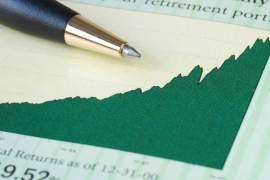
High Dividend Stocks

A dividend is a payment made to a shareholder of stocks. A dividend serves as a share of profits the company is making and can be paid out on a scheduled basis or issued at the discretion of the executive board. Typically, when a company earns profits over its operating costs, that money can be used to either reinvest in the company or be paid to the owners.
High dividend stocks can return a high rate of income as the company pays out a large amounts per the price of the stock. For example, some of the highest returning dividend stocks can return dividends as high as 20% of the stock purchase price. These extremely high dividend yields are often difficult to predict, as the dividend is usually the result of an unforeseen increase in profits over a short period of time. These extremely high dividend stocks are also usually high risk stocks, which may or may not be safe areas of long term investment.
Many blue chip stocks provide high dividend returns and provide a more secure place to invest over a long term period. Many high profile stocks will return between 4% to 6% yearly on their investment. These high dividend stocks are very unlikely to reach the dividend levels of higher risk stocks, however they provide a much more consistent and safer investment option.
In order to best predict which high dividend stocks to invest in, it is important to understand the basic process of how a dividend is distributed.
1. First, all dividends are at the discretion of the board of directors. If a company becomes stagnant or loses money, dividends may be limited or not distributed at all.
2. In order to receive a dividend, you must own the stock before the ex-dividend date through the record date. The time in between these dates can be a couple days to about a week.
3. Payment of the dividend will be made on the payment date, which is often a few weeks after the record date.
While high dividend stocks will often provide relatively quick returns on investments in the stock market, you must consider the tax consequences of these profits. Currently, dividends are taxed according to the income bracket of the taxpayer and are taxed the same as any other source of income. Tax rates can range from 10% for the lowest income bracket up to 25% for the highest taxable income bracket.
Investing in high dividend stocks can provide a relatively safe and consistent source of investment income. As most investment strategies call for, make sure to diversify you investment portfolio, using the numerous types of investment resources available. High dividend stocks can play an important role in your investment portfolio.
NEXT: MACD





















